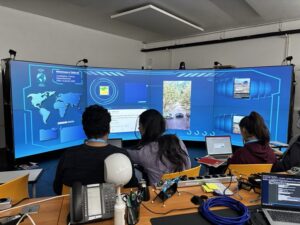Séminaire
How to assess the co-benefits for human health of climate change mitigation and adaptation policies
Kévin Jean, Junior Professor at Institut de Biologie de l’ENS (IBENS), PARSEC (Paris Research on Health Environment and Climate)
Cycle de séminaire Climat & Santé organisé par l’Institut de Biologie de l’ENS et le département de Géosciences de l’ENS.
Description
Responding to climate change requires large-scale, multi-sectoral and transformative adaptation and mitigation policies. By affecting some important environmental and behavioural determinants of health, climate policies may therefore yield substantial co-benefits for public health. Health impact assessment methods based on the detailed data provided within adaptation or mitigation scenarios allow to obtain quantitative estimates of these co-benefits. The approach first involves:
1) modelling, under climate policies scenarios, changes in environmental and/or behavioural factors affecting health,
2) selecting dose-response relationships linking these exposures to health,
and 3) quantitatively evaluating the health implications of these scenarios using various metrics (deaths prevented, years of life or life expectancy gained, and health costs avoided).
This approach also allows to model the distribution of these health impacts across social groups, and thus to project the possible impact of climate policies on health inequalities.
In this talk, I will briefly introduce this approach, the input data it requires and the type of results it can yield, based on illustrations linking climate policies to health determinants such as air pollution, diet, physical activity or access to green spaces.
Free sandwiches will be served after the talk !
Kévin Jean, Junior Professor at Institut de Biologie de l’ENS (IBENS), PARSEC (Paris Research on Health Environment and Climate).
Informations supplémentaires
About the seminar cycle – Approaches and methods to quantify links between climate change and health
See the poster here:
https://hub.bio.ens.psl.eu/index.php/s/sYgLyB4ZxYirtgy
Climate change will have major impacts on human health, and already started to do so. Documenting these impacts, but also the implications that adaptation and mitigation policies may have on human health, is therefore a major issue to feed public decision related to climate change preparedness, adaptation and mitigation.
This short seminar cycles aims at introducing the approaches and methods developed and used at PARSEC (Paris Research on Health, Environment and Climate) in order to foster collaborations with members of other departments and disciplines.
PARSEC is a new research structure dedicated to producing knowledge at the intersection of climate change and health, and supported by the École normale supérieure (ENS-PSL) and Inserm (the French National Institute of Health and Medical Research), and directed by Rémy Slama (IBENS).
Les séminaires auront lieu les 11 septembre, 7 octobre et 6 novembre au département de Géosciences de l’ENS : 24 rue Lhomond – aile Erasme – salle Claude Froidevaux – E314
Les enregistrements de ce cycle seront disponibles sur la chaine Youtube du département : https://www.youtube.com/@Geosciences_ENS






